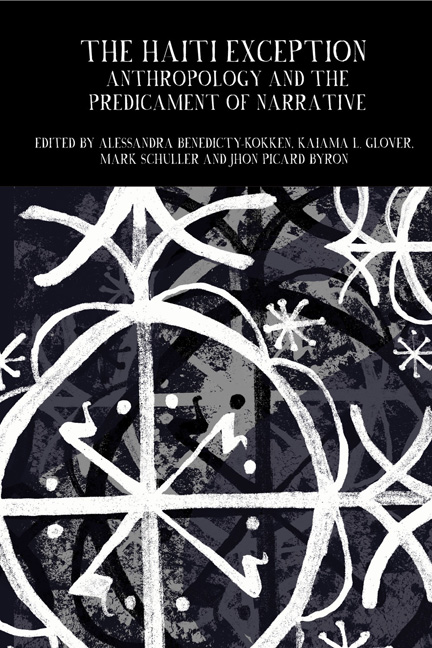Book contents
- Frontmatter
- Contents
- Editors’ Introduction
- I Tracing Intellectual Histories
- The Anthropological Uses of Haiti: A Longue Duré Approach
- Transforming Ethnology: Understanding the Stakes and Challenges of Price-Mars in the Development of Anthropology in Haiti
- On ‘being Jewish’, on ‘studying Haiti’ … Herskovits, Métraux, Race and Human Rights
- Haiti, Gender and Anthrohistory: A Mintzian Journey
- II Interrogating the Enquiring Self
- III On Nation-Building: Histories, Theories, Praxes
- Epilogue: Kalfou Danje: Situating Haitian Studies and My Own Journey within It
- Notes on Contributors
- Index
Haiti, Gender and Anthrohistory: A Mintzian Journey
from I - Tracing Intellectual Histories
- Frontmatter
- Contents
- Editors’ Introduction
- I Tracing Intellectual Histories
- The Anthropological Uses of Haiti: A Longue Duré Approach
- Transforming Ethnology: Understanding the Stakes and Challenges of Price-Mars in the Development of Anthropology in Haiti
- On ‘being Jewish’, on ‘studying Haiti’ … Herskovits, Métraux, Race and Human Rights
- Haiti, Gender and Anthrohistory: A Mintzian Journey
- II Interrogating the Enquiring Self
- III On Nation-Building: Histories, Theories, Praxes
- Epilogue: Kalfou Danje: Situating Haitian Studies and My Own Journey within It
- Notes on Contributors
- Index
Summary
In one of the last essays he wrote before his death in 2011, the anthropologist Fernando Coronil invites us to ‘[i]magine a discussion about truth in a Jorge Luis Borges story written by Italo Calvino and illustrated by M. C. E scher’. Such a story, he imagines, would show us that Haiti is at the centre of the world, a luminous source of historical truth:
In a magnificent square called ‘Paris 1945–2000’, Jean-Paul Sartre, Claude Lévi-Strauss, and Jacques Derrida argue in French about how best to explain human history through forms of reasoning associated with ‘dialectical materialism’, ‘structuralism’ and ‘poststructuralism’. Through a crack in its foundation a passage suddenly opens into a larger square called ‘Europe,’ where Kant, Hegel and Marx animatedly discuss the nature of universal history in German while Heidegger listens. Unbeknownst to them, ‘Europe,’ their assumed center of world history, is located atop a grain of sand, minutely drawn by William Blake's mind. Trapped in a convent built upon the Aztec ruins located inside this granule, Saint Juana Inés de la Cruz reflects on faith through Christian, Muslim and Buddhist theologies. From one of the convent's secret doors, a labyrinthine path 100 years long leads us to an elongated islet, ‘Saint-Domingue, 1791–1820’, where rebel Boukman, a slave who had learned from his African ancestors the power of spirits and plants, places his faith in Legba to battle for freedom, and Ti Noel, a freed slave oppressed under Henry Christophe's kingdom in independent Haiti familiar with Boukman's rebellion and with the Declaration of the Rights of Man and Citizen, at the end of his life comes to declare war against all masters. From a telescope 10 (500)n times more powerful than the Palomar Observatory located in a star of another universe, we could retrace all their words and deeds, backward or forward, floating as cosmic dust, long after their authors died. And if we look for certain words with care, we may be able even to find those brought together by Alejo Carpentier in a historical model and read that in a place called The Kingdom of this World, where each individual light came to be valued as a precious universe, historical truth was discovered to be fundamentally practical, a matter of struggling against the forces that limit life, the source and aim of history, an elusive marvel. (Coronil, 2011: 303–04)
- Type
- Chapter
- Information
- The Haiti ExceptionAnthropology and the Predicament of Narrative, pp. 74 - 90Publisher: Liverpool University PressPrint publication year: 2016



